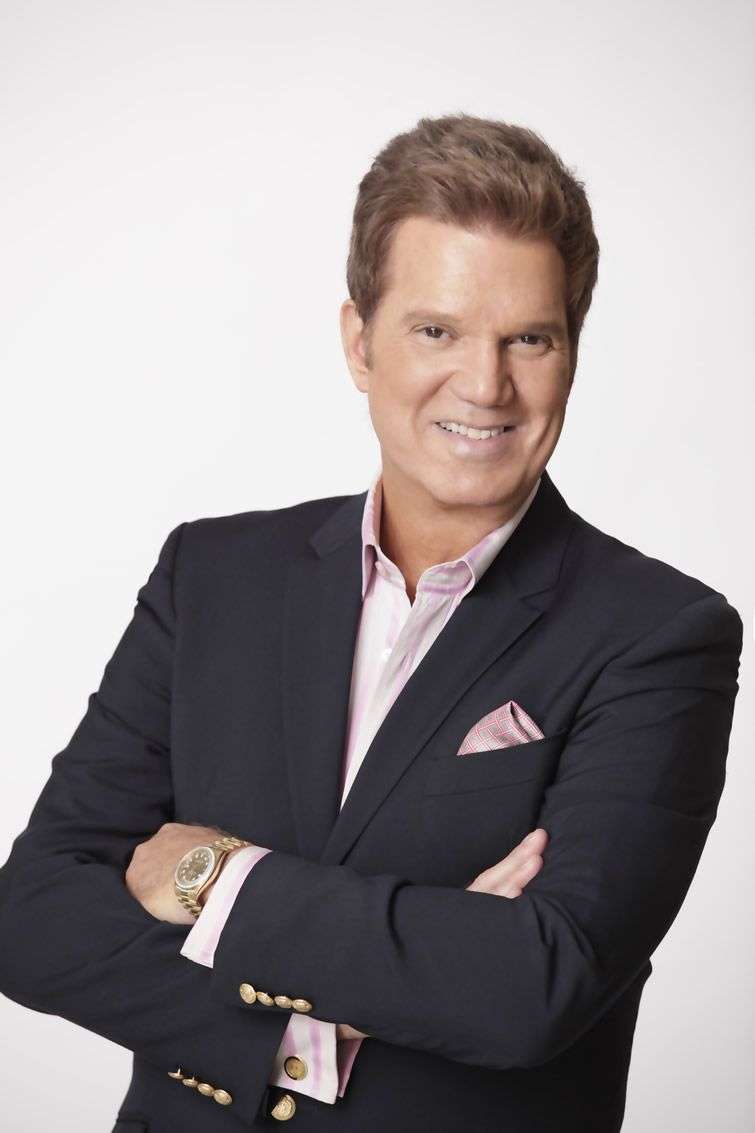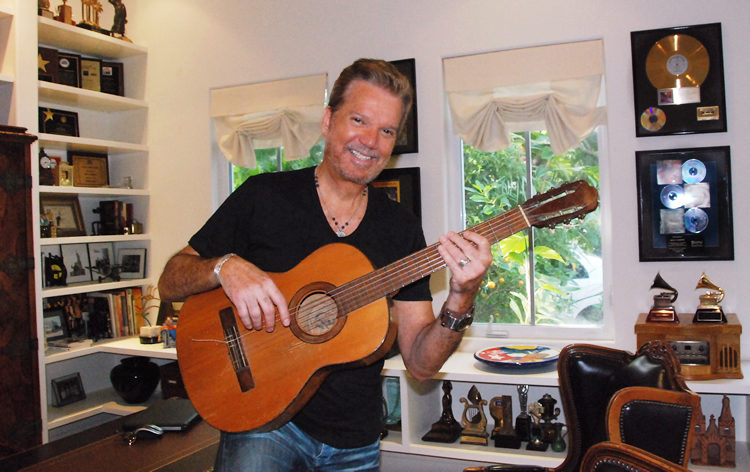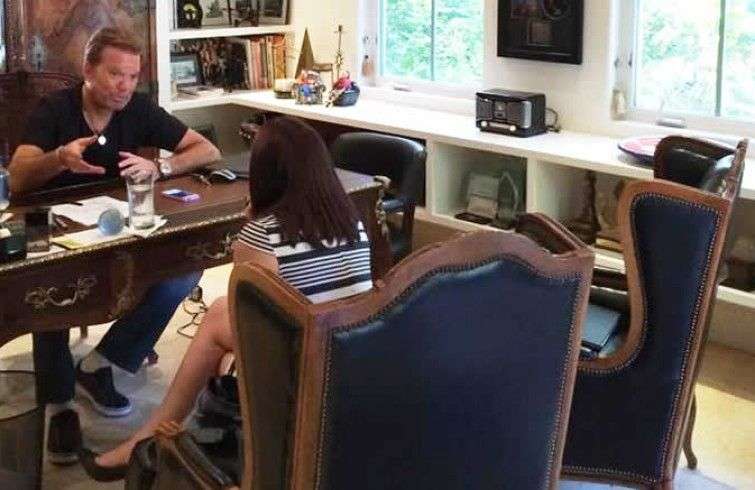We went into an office with an eclectic décor that still owed much to the colonial style. On the wall, the acknowledgements received over nearly 50 years mixed perfectly with family photos and a guitar that seemed a witness to every word, gesture and expression.
Serene and with a very soft tone of voice, composer, arranger, singer-songwriter and winner of the 2014 Latin Grammy Music Excellence Award, Willy Chirino, the music legend, was today another Cuban émigré telling us of his life, his experiences, his successes and his nostalgia.
Wilfredo Jose Chirino, born in Pinar del Rio. If we consider how popular your music is in the Spanish-speaking market, we could say you’re a world-renowned Cuban. Singer, composer and producer…tell us about your first steps in the music industry.
I arrived from Cuba with a tremendous interest in music. Back in my hometown, I played percussion with musicians from the neighborhood, but I had never sat in front of a set of drums or anything like it. That didn’t stop me from telling my friends I was a drummer. I did have my own set in my bedroom. I used a book to hold up the dishes and the sticks were made out of coat-hangers. I would watch TV and movies and try to imitate how they played the drums with those things I had.
One day – I must have been 15 years old – we were at a party at the St. Peter and Paul Catholic school that’s on 12th and 14th Street South West. I’d already told my buddies I played the drums. The party was going and they were playing music, so my friends said to me: “Hey, we asked the drummer if you could play, and he said yes.” I wanted to stick my head in the ground, I didn’t know what to do. I’d never sat in front of a set of drums in my life. I’d done everything with the imaginary set I had at home. We started to play something, a melody called “Way Pau”, and I was imitating the movements I made back in my room, and they bought it (laughs). Then, two of them who played the guitar and one who played the bass went over to the school parish priest and we convinced him to buy me a set of drums, in exchange for us playing at school parties. That’s how it all started.
Do you remember the first time you sang a children’s or adult song? What piece made you say “I want to be a singer, I want to be an artist”?
I don’t remember. You know why? Because I had a career as a musician that lasted for many years before I became a singer. In fact, I used to play 6 nights a week at different nightclubs around the city from the time I was 16. I started playing the drums, then I started playing bass, then guitar. I couldn’t stop working because what I earned was absolutely essential to supporting my family, my father and my brothers. So I learned to play several instruments so as not to be left out of a job, and, often, I would say to the director of the band, Pablo Cano (who played the guitar): “Hey, let me play a bolero.” I would start singing and he’d say to me: “Don’t sing, you play very well…you’re a great musician.”
I played the drums very well, actually. I was a good musician, always was, but I’m not anymore. Back when I played the drums, I was. I no longer play. Like everything else in life, you have to practice to keep good at what you do.
You arrived in the United States when you were 14, in 1961. That’s when your career picked up. What made you decide to start your own band?
That’s very simple. You ask yourself: how do things work here? Who are the people making money and becoming music stars? Drummers or singers? So I started writing songs and said to myself: I’m going to sing no matter what.
What song did you break into the US stage with?
Viva la buena vida (“Living the Good Life”). At the time, there was only one broadcaster in Miami that aired Latin music throughout, from dusk till dawn. They picked up the song and made it the show’s theme. That was the first time I heard myself on the radio and said “wow!” All artists can distinctly remember the first time they heard themselves on the radio. That was a huge achievement.
Did this start in the music world in Miami involve the creation of your own style?
Definitely. It’s a music movement, it’s the sound of Miami. I was a very important part of that, I don’t deny it, but I wasn’t the founder. It’s a music movement like mambo, rock and roll and cha cha cha were in their time. In fact, the first album with that music style ever to be released internationally was mine. It’s the album with Vive la Buena vida and Soy (“I Am”). It was a big hit here in town. All of the songs were played on the radio, except a rock piece.

According to some articles, you are considered one of the pioneers of that music style in Miami, a fusion of Cuban music, rock, jazz and Brazilian rhythms. Does this have anything to do with your experiences next to Tito Puentes and Julio Gutierrez?
Naturally, but that was before, when I was a musician. I went off to New York with Julio Gutierrez when I was 17. People like La Lupe, Tito Puentes, Ray Barreto and Miguelito Valdes played where I played. All of these legends from the time would jam with us. I learned a lot from them. It was the time when you’re a teenager and absorb everything.
You’ve recorded more than 30 albums. Your more popular pieces include Soy, which we’ve talked about already, and Nuestro dia viene llegando (“Our Day is Coming”), which has been played many times, even on the island. Would you be willing to sing these songs in your hometown in Pinar del Rio?
Naturally. I’ve been asking to do this for years, but they won’t let me. My conditions now are that there be no conditions. I’m a free Cuban. Cubans in Cuba are not free. What’s the matter? I go to Mexico, Puerto Rico, Argentina and Europe and neither the government, nor the promoter nor anyone tells me what to sing.
Who would you take to Cuba to sing to Cubans?
Many people: Amaury Gutierrez, my wife Lisette, Albita, Arturo Sandoval, I could give you a huge list….Carlos Oliva. There are many artists I would like to share the stage with, including Cuban artists who live in Cuba, such as Gorki Avila, Los Aldeanos and other musicians. It would be a great pleasure.
Do you feel any nostalgia for Cuba?
Naturally, I’m from Pinar del Rio, the land of tobacco. I tell people that, if I could bottle the scent of Pinar del Rio’s moist earth, I would. It’s something I do not forget. I come from a tobacco-growing area. Whenever it rained, the plants would give off a very special, rich and sweet smell. I feel tremendous nostalgia for that. It’s a part of what I am. I feel tremendous nostalgia for Cuba, especially for the countryside, where the lives of peasants are entirely different from the lives of people who live in the big city.
You once said you believed in the exchange of ideas, invoking a phrase by Jose Marti. I quote: “When freedom is at stake, let the fires rage. Even art should be used to feed the flames.” What comes to mind when you read or hear this phrase again?
I think that it’s an incredible message for Cuban artists today. Martí is telling you very clearly: “Hey, when freedom is at stake, use your art to bring about changes that call for freedom.” Your art is a weapon, a rifle you can use to bring about change. Even art should be used to feed the flames, it’s crystal clear. That’s my life’s motto.
Do you read Marti?
I don’t read anyone. I am unable to read. I start reading and my mind wanders somewhere else three seconds later. I haven’t read one book in my life, I admit it. I wish I could. People who read a lot have an extraordinary culture. However, I think there’s no better teacher than the street. The experiences I’ve had, working six nights a week, something that doesn’t happen with artists today, I’ve learned things and I tell my kids about them all the time. You don’t learn those things at a university.
Do you consider yourself a man of peace?
Of course! I’m a man of peace, a serene man. I believe I’ve achieved harmony, and not only with my family. I believe a person succeeds in life when they manage to strike a balance and do what they really love. I don’t make recordings so they’ll be successful commercially; I make music so that 50 or 100 years from now, people can feel inspired by the music I’ve created. That is the task of the artist, in essence: to achieve immortality through their work. It’s far more important than money and fame. This is what makes applause the greatest gift. We bring on human emotions, the artist makes you laugh, makes you think and makes you cry. If you manage to evoke those emotions in a person, you’re an artist. I think I’ve achieved that.












No jorobess, Willy Chirino! Con tanta kk que has hablado de nosotros y nuestra isla a lo largo de tu carrera… Venir ahora con nostalgias y esas pendejadas a esta hora del siglo 21….Sigue online y oncuba…
Estas flipado/a.